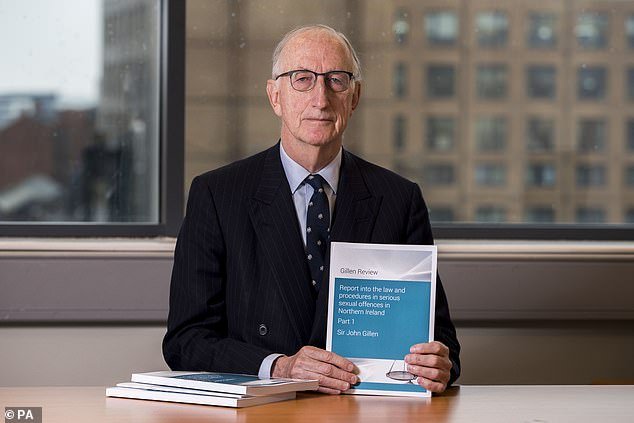The public are to be cleared from courtrooms when complainants give evidence in rape cases under new plans to boost prosecution rates in sexual assault cases.
The move, which judges will be advised to consider, is intended to reduce the trauma complainants face having to recount their abuse when giving evidence.
It was recommended by a 2019 inquiry into sexual offence trials by Lord Justice Sir John Gillen and will form part of a cross-Government review to be published this spring, The Telegraph reported.
As well as removing the public from courts during complainant testimony, the review will also recommend wider use of pre-recorded statements so that complainants do not have to appear in court.
A public education campaign to combat myths surrounding rape will also be recommended along with more specialist support for victims and limits to stop police combing through complainant’s past sexual relationships, the paper said.
The new measures are intended to address the slump in rape prosecutions which sees half of complainants drop legal action amid invasive investigations, a lower likelihood of securing a conviction and the prospect of having to recount their experience in court under cross-examination.
The public are to be cleared from courtrooms when complainants give evidence in rape cases under new plans to boost prosecution rates in sexual assault cases. The move, which judges will be advised to consider, is intended to reduce the trauma complainants face having to recount their abuse when giving evidence. It was recommended by a 2019 inquiry into sexual offence trials by Lord Justice Sir John Gillen (pictured) and will form part of a cross-Government review to be published this spring [File photo]
‘This is not just about being soft and cuddly. There is a real issue of people dropping out of investigations at an early stage,’ a source told The Telegraph.
‘It is as much about being supportive as it is about improving outcomes in trial.’
How judges operate will be one of four focuses of the review. Judges already have powers to remove the public from court at the request of the police and prosecution under the Youth and Criminal Evidence Act 1999.
‘The judiciary is independent but are judges always doing the right thing in the way they direct juries? Does there need to be a wider public education campaign about what the myths are about these types of offences?,’ The Telegraph quoted a source as saying.
‘Are judges making the best use of their powers like clearing public galleries. There is generally a feeling that that is not used enough. Should they consider using that more?’
Sir John Gillen’s review was set up after a highly-controversial rape trial in 2018 in which Irish rugby players Paddy Jackson and Stuart Olding were cleared of raping a woman after a night out.
The nine-week trial dominated the news in Ireland where people protested against the verdict and the treatment of the complainant.
The complainant spent eight days in the witness box during which time she was cross-examined by four sets of barristers, all of whom were men. Her bloodied thong was also passed to the jury for examination, The Guardian reported.
The review recommended clearing the public gallery during the complainant’s evidence or everyone except the press and a friend, relative or parent of the complainant and the accused.
It also recommended using a code or cipher for the complainant to protect their identity and guaranteed anonymity after death.
Dame Vera Baird, the victims’ commissioner, said instructions for galleries to be cleared more frequently would ‘send out a strong message for complainants that there is a real consideration for them and judges understand the pressures they are under when they are testifying.’
‘In rape cases, the proportion withdrawing support for prosecution has almost doubled from 23 per cent in 2015 to over 44 per cent in 2020. This can’t be allowed to continue,’ she was quoted by The Telegraph as saying.
The second focus of the review will look at setting legal limits on ‘proportionate’ disclosure when a complainant’s phone is taken as evidence.
‘It is where the victim feels they are being investigated more than the offender. That’s out of kilter with other offences,’ a source told The Telegraph.


Sir John Gillen’s review was set up after a highly-controversial rape trial in 2018 in which Irish rugby players Paddy Jackson (left) and Stuart Olding (right) were cleared of raping a woman after a night out. The nine-week trial dominated the news in Ireland where people protested against the verdict and the treatment of the complainant
The third, will see the Crown Prosecution Service, the police and other bodies work more closely together at an earlier stage. This will be backed by more resources.
The final focus will be improved support for complainants, enforced in a new victim’s law. The support will include independent sexual assault advisors (IVSAs) who will guide and advise complainants at every stage of the legal proceedings.
The Telegraph reported that the Ministry of Justice also intends to extend a pilot scheme at three courts nationwide.
The courts, in Kingston, Liverpool and Leeds, have allowed complainants who were fearful of intimidation by their alleged attacker to give pre-recorded evidence.
The evidence was cross-examined by lawyers in the presence of a judge and screened-off defendant, the paper said.
The upcoming review comes after rape convictions in England and Wales fell to a record low.
Data from the Crown Prosecution Service released in June 2020, showed that in 2019-20, 1,439 suspects in cases where a rape had been alleged were convicted of rape or another crime, the BBC reported.
The total was half the number of convictions three years ago, while the number of completed prosecutions in ‘rape-flagged’ cases was the lowest since tracking began in 2009.
The CPS said it was ‘working hard to reverse the trend’.
